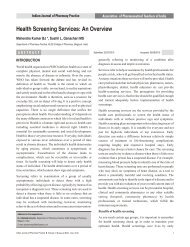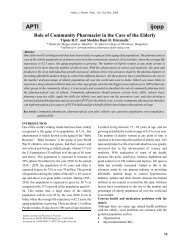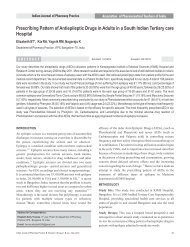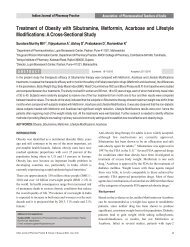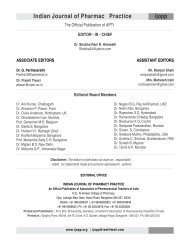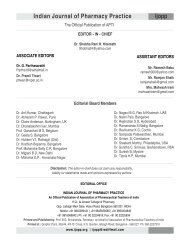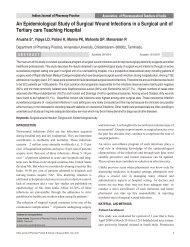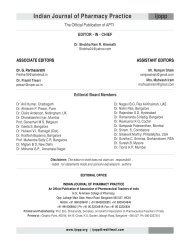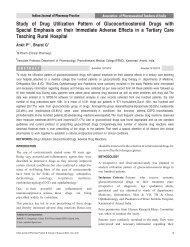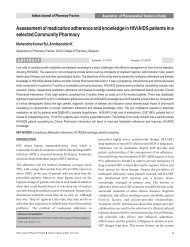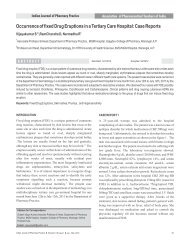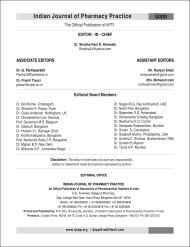<strong>Indian</strong> J. Pharm. Pract. 1(2), Jan-Mar, 2009Overall, there now appears to be ample evidence that theprovision <strong>of</strong> clinical pharmacy services in the psychiatriccontext is justifiable, both form an economic point <strong>of</strong>view, and more important, to help assure safe andeffective drug therapy for patients affected by mentalillness. The challenge is for practitioners to develop andsustain a practice model that can allow the delivery <strong>of</strong>these services, both in hospitals and in the communitysector. Inherent to this challenge is the need to devisepersuasive business cases that can be used in influencepayors and governmental bodies, so that these servicescan eventually become routinely available where needed.A framework for the delivery <strong>of</strong> clinical pharmacyservices in psychiatryAlthough other systems have been proposed, theconceptual framework that had its foundations in thework relating to the pharmaceutical care model has beenwidely embraced as a basis for the work <strong>of</strong> clinicalpharmacists in many settings. Strand et al. define amedication-related problem as 'any undesirable eventexperienced by the patientthat involves or is suspected toinvolve drug therapy and that actually or potentially29interferes with a desired patient outcome'. Using thismodel, pharmacists can base their clinical practicearound the prevention, detection, documentation andresolution <strong>of</strong> drug-related problems (DRPs). Theoriginal eight categories <strong>of</strong> DRP proposed in this systemare outlined with examples in Table 2.The current and active set <strong>of</strong> clinical pharmacy practicestandard from the Society <strong>of</strong> Hospital Pharmacists <strong>of</strong>30Australia (SHPA) was disseminated in 2004, anddescribes clinical pharmacy practice as the practice <strong>of</strong>pharmacy in the context <strong>of</strong> multidisciplinary healthcareteam, directed at achieving quality use <strong>of</strong> medicines.Each <strong>of</strong> the clinical pharmacy functions outlined in theSHPA practice standards are directly applicable in thecontext <strong>of</strong> psychiatry, and include, but are not limited to:active participation in the management <strong>of</strong> individualpatientsassistance with the application <strong>of</strong> the best availableevidence in daily clinical practicecontribution <strong>of</strong> clinical knowledge and skills to thehealthcare teamidentification and reduction in risks associated withmedicines useinvolvement in the education <strong>of</strong> patients, carers, andother health pr<strong>of</strong>essionals and involvement inresearch.The guidelines provide information about a range <strong>of</strong>activities that are components <strong>of</strong> contemporary clinicalpharmacy practice. These include those activities that areoriented towards the management <strong>of</strong> DRPs for theindividual patients – measures such as obtaining anaccurate medication history, assessment <strong>of</strong> currentmedication management, clinical review, therapeuticdrug monitoring, ward round participation, provision <strong>of</strong>medicines information to health pr<strong>of</strong>essionals andpatients, adverse drug reaction management and others.In addition, the guidelines outline other aspects <strong>of</strong>clinical pharmacy practice that although not focusedupon individual patient outcomes, still have directrelevance for psychiatric pharmacy practice. Theseinclude clinical research, teaching and quality assuranceactivities.Practical implementation <strong>of</strong> clinical pharmacyservices in psychiatryParticularly, if a practitioner has not had experience in thefield <strong>of</strong> psychiatry, the implementation <strong>of</strong> clinicalpharmacy services in a psychiatric unit can prove to be adaunting task. If there is no existing base to build upon,the best advice would be to start with modest aims, andwork steadily to build relationships with clinicians andpatients. Take every opportunity to participate ininterdisciplinary meetings, and to learn from theexperience and wisdom <strong>of</strong> medical, nursing andparamedical colleagues. Listen actively and carefully toinformation presented in multidisciplinary meetings, andunderstand that a holistic approach to patient care mustbe used to underpin the provision <strong>of</strong> clinical pharmacyservices. It is important to be able to acknowledge that insome cases, drug therapy (although possibly important)is not the only way to approach the management <strong>of</strong>psychiatric illnesses: psychological therapy, communitybased support, counselling, and the provision <strong>of</strong> practicalassistance in difficult times can be vital to the success <strong>of</strong>overall treatment.In some cases, it may be necessary to prioritise andprogressively implement clinical pharmacy services in away that is commensurate with the resources available.Under these circumstances, it is vital to ensure that basicfunctions with high impact upon patient outcomes areafforded the highest priority. Medication chart review,assistance through the provision <strong>of</strong> high quality druginformation, adverse drug reaction and drug interactionscreening, and work directly at ensuring the patients havean adequate understanding <strong>of</strong> their medications are themost important functions,as well as making sure thatthere are adequate supplies <strong>of</strong> medication available to thepatient, and that the patient has the insight and motivation4
<strong>Indian</strong> J. Pharm. Pract. 1(2), Jan-Mar, 2009In many cases, enlisting the support <strong>of</strong> family or closefriends <strong>of</strong> the patient can assist with these objectives. Aspractitioners begin to accumulate increasing experiencein psychiatric clinical pharmacy practice, they developgreater understanding <strong>of</strong> the special challenges involved:these include communicating with the mentally impairedpatient, recognising a patient who might be a danger tothemself or to others, dealing with issues relating tosubstance abuse (more common amongst patients withsevere psychiatric illness), and problems in helpingpatients to adhere to the prescribed therapy. Althoughclinical pharmacy practice in psychiatry is challenging,it is certainly rewarding in equal measure. In choosing towork in this field, a pharmacist chooses to deal withpatients who are <strong>of</strong>ten both chronically and severelyphysically and mentally unwell. There is extensivepolypharmacy with drugs <strong>of</strong> low therapeutic index.Serious adverse drug reactions and drug interactions arecommon. Mentally ill patients are amongst thevulnerable and underprivileged in any society: arguablythere is no higher calling in clinical pharmacy thanworking for the protection and assistance <strong>of</strong> these people.Table 4.1Key findings <strong>of</strong> epidemiological studies <strong>of</strong> mental illnessStudy Setting Key findingsGlobal Burden <strong>of</strong> Disease Worldwide Unipolar depression leading cause <strong>of</strong> disabilityBurden <strong>of</strong> Disease & Injury inAustraliaNational Survey <strong>of</strong> Mental Healthand Wellbeing <strong>of</strong> AdultsMental Health Disorders inAustralian VeteransMental Health: Report <strong>of</strong> theSurgeon GeneralMental Health Supplement to theOntario Health SurveyNational Psychiatric MorbidityNetherlands Mental Health Surveyand incidence studyTaiwan PsychiatricEpidemiological ProjectAustraliaAustraliaAustraliaUSACanadaBritainNetherlandsTaiwanMental disorders account for 30% <strong>of</strong> non-fataldisease in Australia. Depression and dementiasforemost causes <strong>of</strong> disability caused by mentalillness18% <strong>of</strong> Australians affected by key mentalillnesses Health and during the preceding 12months. 34.5% Wellbeing <strong>of</strong> adults experienceddisability.GAD, PTSD, Depression and alcohol abuse mostVeteran Community (Veterans) common. PTSDaccounts for > 50% <strong>of</strong> accepted mental healthclaims.One-year prevalence <strong>of</strong> diagnosable mental illnessapproximately 22-23%. Prevalence for anxietydisorders and mood disorders 16.4% and 7.1%respectively.18.6% affected, 14.2% with one disorder, 4.5%two or more disorders. Anxiety disorders (12.2%),affective disorders (4.5%) and substance usedisorders (5.2%) most prevalent.16% <strong>of</strong> subjects met screening criteria for mentaldisorders Surveys <strong>of</strong> Great Britain. No differencesamongst geographical regions <strong>of</strong> Great BritainLifetime prevalence <strong>of</strong> 41.2% and 12-monthprevalence 23.3% for psychiatric disordersLifetime prevalence estimates <strong>of</strong> 16-28%depending upon setting.5
- Page 1: Indian Journal of Pharmacy Practice
- Page 4 and 5: Indian Journal of Pharmacy Practice
- Page 7 and 8: APTIIndian J. Pharm. Pract. 1(2), J
- Page 12 and 13: Indian J. Pharm. Pract. 1(2), Jan-M
- Page 14 and 15: APTIijoppGenesis, Development and P
- Page 16 and 17: Indian J. Pharm. Pract. 1(2), Jan-M
- Page 19 and 20: Indian J. Pharm. Pract. 1(2), Jan-M
- Page 21 and 22: Indian J. Pharm. Pract. 1(2), Jan-M
- Page 23 and 24: Indian J. Pharm. Pract. 1(2), Jan-M
- Page 25 and 26: Indian J. Pharm. Pract. 1(2), Jan-M
- Page 27 and 28: Indian J. Pharm. Pract. 1(2), Jan-M
- Page 29 and 30: Indian J. Pharm. Pract. 1(2), Jan-M
- Page 31 and 32: Indian J. Pharm. Pract. 1(2), Jan-M
- Page 33 and 34: Indian J. Pharm. Pract. 1(2), Jan-M
- Page 35 and 36: Indian J. Pharm. Pract. 1(2), Jan-M
- Page 37 and 38: Indian J. Pharm. Pract. 1(2), Jan-M
- Page 39 and 40: Indian J. Pharm. Pract. 1(2), Jan-M
- Page 41 and 42: Indian J. Pharm. Pract. 1(2), Jan-M
- Page 43 and 44: Indian J. Pharm. Pract. 1(2), Jan-M
- Page 45 and 46: Indian J. Pharm. Pract. 1(2), Jan-M
- Page 47 and 48: Indian J. Pharm. Pract. 1(2), Jan-M
- Page 49 and 50: Indian J. Pharm. Pract. 1(2), Jan-M
- Page 51 and 52: Indian J. Pharm. Pract. 1(2), Jan-M
- Page 53 and 54: pivotal to the rational use of medi
- Page 55 and 56: .leadership” (Cohen, 1984). A stu
- Page 57 and 58: Indian J. Pharm. Pract. 1(2), Jan-M
- Page 59 and 60:
Indian J. Pharm. Pract. 1(2), Jan-M
- Page 61 and 62:
Indian J. Pharm. Pract. 1(2), Jan-M
- Page 63 and 64:
Indian J. Pharm. Pract. 1(2), Jan-M
- Page 65 and 66:
Indian J. Pharm. Pract. 1(2), Jan-M
- Page 67 and 68:
Indian J. Pharm. Pract. 1(2), Jan-M
- Page 69 and 70:
Indian J. Pharm. Pract. 1(2), Jan-M
- Page 71 and 72:
Indian J. Pharm. Pract. 1(2), Jan-M
- Page 73 and 74:
Indian J. Pharm. Pract. 1(2), Jan-M
- Page 75 and 76:
Indian J. Pharm. Pract. 1(2), Jan-M
- Page 77 and 78:
Indian J. Pharm. Pract. 1(2), Jan-M
- Page 79 and 80:
Indian J. Pharm. Pract. 1(2), Jan-M
- Page 81 and 82:
Indian J. Pharm. Pract. 1(2), Jan-M
- Page 83 and 84:
Indian J. Pharm. Pract. 1(2), Jan-M
- Page 85 and 86:
Indian J. Pharm. Pract. 1(2), Jan-M
- Page 87 and 88:
Indian J. Pharm. Pract. 1(2), Jan-M
- Page 89 and 90:
Indian J. Pharm. Pract. 1(2), Jan-M
- Page 91 and 92:
Indian J. Pharm. Pract. 1(2), Jan-M
- Page 93 and 94:
Indian J. Pharm. Pract. 1(2), Jan-M



